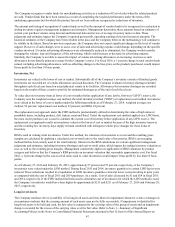Albertsons 2016 Annual Report Download - page 42
Download and view the complete annual report
Please find page 42 of the 2016 Albertsons annual report below. You can navigate through the pages in the report by either clicking on the pages listed below, or by using the keyword search tool below to find specific information within the annual report.40
NON-GAAP FINANCIAL MEASURES
The Company’s Consolidated Financial Statements are prepared and presented in accordance with generally accepted
accounting principles (“GAAP”). In addition to the above analysis of results of operations, the Company also considers certain
other non-GAAP financial measures to assess the performance of our businesses. The measures and items identified below,
such as Adjusted EBITDA, are provided as a supplement to our results of operations and related analysis, and should not be
considered superior to, a substitute for or an alternative to any financial measure of performance prepared and presented in
accordance with GAAP. Investors are cautioned that there are material limitations associated with the use of non-GAAP
financial measures as an analytical tool. Certain adjustments to our GAAP financial measures reflected below exclude certain
items that are occasionally recurring in nature and may be reflected in our financial results for the foreseeable future. These
measurements and items may be different from non-GAAP financial measures used by other companies. All measurements are
provided with a reconciliation from a GAAP measurement. The non-GAAP financial measures below should only be
considered as an additional supplement to the Company’s financial results prepared in accordance with GAAP and should be
reviewed in conjunction with the Company’s results reported in accordance with GAAP in this Annual Report on Form 10-K
for the fiscal year ended February 27, 2016.
The Company utilizes certain non-GAAP measures, including Adjusted EBITDA, to analyze underlying core business trends to
understand operating performance and as a compensation performance measure. Adjusted EBITDA is a non-GAAP
supplemental performance measure the Company uses to facilitate operating performance comparisons of our businesses on a
consistent basis. In addition, management believes Adjusted EBITDA as a measure of business performance provides investors
with useful supplemental information. Adjusted EBITDA provides additional understanding of other factors and trends
affecting our business, which are used in the business planning process to understand expected performance, to evaluate results
against those expectations, and as one of the compensation performance measures under certain compensation programs and
plans.
The Company defines Adjusted EBITDA as Net earnings (loss) from continuing operations, plus Interest expense, net and
Income tax provision (benefit), less Net earnings attributable to noncontrolling interests calculated in accordance with GAAP,
plus non-GAAP adjustments for Depreciation and amortization, LIFO charge (credit), certain non-recurring or unusual
employee-related costs and pension related items (including severance costs, accelerated stock-based compensation charges,
pension settlement charges, multiemployer pension withdrawal charges and other items), charges and costs related to debt
financing activities, non-cash asset impairment and other charges and gains (including asset write-offs, store closures, market
exits and certain gains on the sale of property), goodwill and intangible asset impairment charges, costs related to the separation
of businesses, legal settlement charges and gains, contract breakage costs and certain other non-cash charges or unusual items.
These items are omitted either because they are non-cash items or are items that are not considered in our supplemental
assessment of our on-going business performance. Certain of these adjustments are considered in similar supplemental analyses
by other companies, such as Depreciation and amortization, LIFO charge (credit) and certain other adjustments. Adjusted
EBITDA is less disposed to variances in actual performance resulting from depreciation, amortization and other non-cash
charges and credits, and more reflective of other factors that affect the Company’s underlying operating performance.
There are significant limitations to using Adjusted EBITDA as a financial measure including, but not limited to, it not reflecting
cash expenditures for capital assets or contractual commitments, changes in working capital, income taxes and debt service
expenses that are recurring in the Company's results of operations.
























